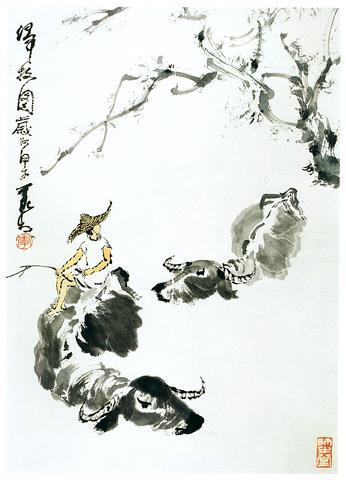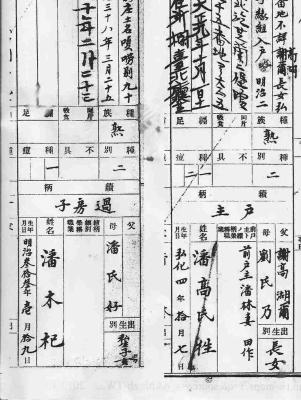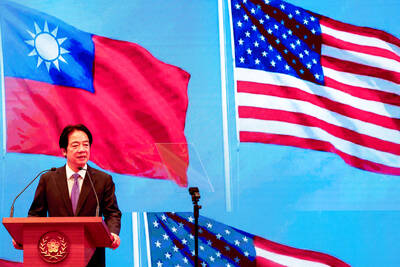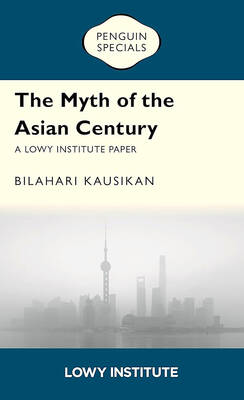Dai Dong-ni (
Over 100 originals by some 60 Chinese master painters have been gathered under one roof for viewers to appreciate up close. These include: Wu Chang-shuo's (
Dai Mei-ling (

PHOTO COURTESY OF NCA
The Changan school of paintings is one of the main categories of Dai Family's collection. Shi Lu (
Gao Chian-fu (
Fu Bao-shi (傅抱石), a well-known figure of the Chingling school, was the first painter to disregard the painting tradition of leaving blank space on the panel. His Landscape series, in which minimalist human figures appear against rugged, overwhelming cliffs, powerfully evokes the magnificence of central Chinese mountains.
Horses are Hsu Bei-hong's most celebrated subject. Hsu applied his knowledge of anatomy to painting the joints and calves of the horses and insisted on reserving one particular brush for painting the tail. These characteristics are evident in Hsu's Horse, on show at the exhibition.
Among other rare finds are Empress Dowager Zi Hsi's (
Collection of 19th to 20th Century Genuine Traditional Chinese Painting and Calligraphy will run through March 21 at National Cultural Association, 15 Chongqing S Rd., Sec 2, Taipei (

Feb. 9 to Feb.15 Growing up in the 1980s, Pan Wen-li (潘文立) was repeatedly told in elementary school that his family could not have originated in Taipei. At the time, there was a lack of understanding of Pingpu (plains Indigenous) peoples, who had mostly assimilated to Han-Taiwanese society and had no official recognition. Students were required to list their ancestral homes then, and when Pan wrote “Taipei,” his teacher rejected it as impossible. His father, an elder of the Ketagalan-founded Independence Presbyterian Church in Xinbeitou (自立長老會新北投教會), insisted that their family had always lived in the area. But under postwar

In 2012, the US Department of Justice (DOJ) heroically seized residences belonging to the family of former president Chen Shui-bian (陳水扁), “purchased with the proceeds of alleged bribes,” the DOJ announcement said. “Alleged” was enough. Strangely, the DOJ remains unmoved by the any of the extensive illegality of the two Leninist authoritarian parties that held power in the People’s Republic of China (PRC) and Taiwan. If only Chen had run a one-party state that imprisoned, tortured and murdered its opponents, his property would have been completely safe from DOJ action. I must also note two things in the interests of completeness.

Taiwan is especially vulnerable to climate change. The surrounding seas are rising at twice the global rate, extreme heat is becoming a serious problem in the country’s cities, and typhoons are growing less frequent (resulting in droughts) but more destructive. Yet young Taiwanese, according to interviewees who often discuss such issues with this demographic, seldom show signs of climate anxiety, despite their teachers being convinced that humanity has a great deal to worry about. Climate anxiety or eco-anxiety isn’t a psychological disorder recognized by diagnostic manuals, but that doesn’t make it any less real to those who have a chronic and

When Bilahari Kausikan defines Singapore as a small country “whose ability to influence events outside its borders is always limited but never completely non-existent,” we wish we could say the same about Taiwan. In a little book called The Myth of the Asian Century, he demolishes a number of preconceived ideas that shackle Taiwan’s self-confidence in its own agency. Kausikan worked for almost 40 years at Singapore’s Ministry of Foreign Affairs, reaching the position of permanent secretary: saying that he knows what he is talking about is an understatement. He was in charge of foreign affairs in a pivotal place in